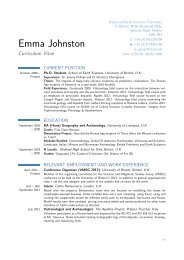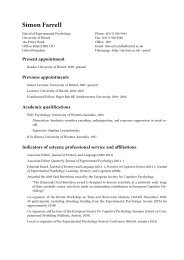What is Scientific Progress?
What is Scientific Progress?
What is Scientific Progress?
Create successful ePaper yourself
Turn your PDF publications into a flip-book with our unique Google optimized e-Paper software.
Real<strong>is</strong>m can survive a weakening of the claim to the assertion that almost always science has progressed. The claim that<br />
science has always progressed might be restricted to a given period.<br />
11 The ex<strong>is</strong>tence of scientific progress <strong>is</strong> cons<strong>is</strong>tent with the loss of non-scientific knowledge such as (valuable but<br />
unscientific) knowledge of herbal remedies.<br />
12 Peter Lipton makes the point that the Darwinian evolution of theories rules out an application of enumerative<br />
induction on the falsity of past theories. See (Lipton 2000, 197ff).<br />
13 The current record <strong>is</strong> 9.79 seconds.<br />
14 On the pessim<strong>is</strong>tic induction, Kuhn says, “All past beliefs about nature have sooner or later turned out to be false.”<br />
(Kuhn 1992, 14)<br />
15 The argument <strong>is</strong> elaborated in (Hoyningen-Huene 1993, 263-4).<br />
16 For a more extended d<strong>is</strong>cussion, see (Bird 2000).<br />
17 C.f. footnote 9.<br />
18 In pursuing science one may have goals other than the gaining of knowledge. But the goal of knowledge <strong>is</strong> the central<br />
and constitutive goal, in that if in general X <strong>is</strong> pursued without aiming at knowledge then X <strong>is</strong> not science. For example,<br />
science and technology are today much intertwined, so a research project might have the technological aim of<br />
producing a more malleable kind of steel and the scientific one of knowing things about the malleability of different<br />
kinds of steel alloy. However, should a process be pursued without any view to generating knowledge, such as making<br />
unsystematic adjustments to an ex<strong>is</strong>ting technique in order to make it work better, then that process would not be<br />
scientific, even though it might be technological.<br />
19 Something like th<strong>is</strong> seems to be David Papineau’s view: he thinks of knowledge as the ‘state a concerned enquirer<br />
needs to get into as a means to achieving [the] desire [to avoid false beliefs].’ (Papineau 1993, §5.5). Not believing at<br />
all <strong>is</strong> the best way of avoiding false belief, but presumably the concerned enquirer want to have beliefs (indeed true<br />
ones). So Papineau’s individual <strong>is</strong> someone who seeks (true) beliefs at the same time as aiming to avoid false ones.<br />
Knowledge, on h<strong>is</strong> view, <strong>is</strong> the what one ends up in when appropriately pursuing th<strong>is</strong> complex aim.<br />
20 Th<strong>is</strong> <strong>is</strong> the principle of safety. (See Williamson 2000, c.7) Safety <strong>is</strong> linked to the thought that to give us knowledge<br />
our belief-forming processes should be reliable.<br />
21 For their kind and helpful comments, I am grateful to Katherine Hawley, Johannes Persson, and audiences in<br />
Edinburgh (the Scots Philosophical Club), Cambridge, Lund, and Belfast (BSPS annual conference 2003).<br />
40






